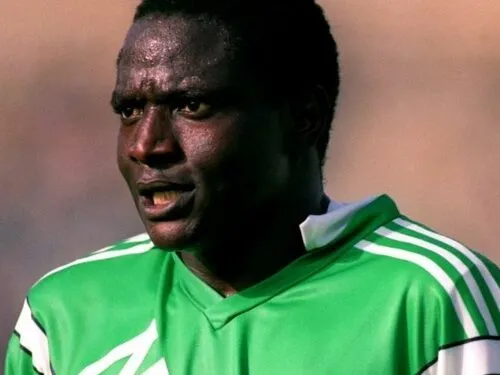Introduction
Rashidi Yekini, born October 23, 1963, in Kaduna, Nigeria, and passing on May 4, 2012, in Ibadan, was a Nigerian football icon and the country’s all-time top goal scorer, netting 37 goals in 58 appearances for the Super Eagles. His pivotal goal in Nigeria’s first World Cup match in 1994 against Bulgaria and his 1993 African Footballer of the Year award cemented his legacy. Scoring 183 goals in 174 games for Vitória Setúbal in Portugal, Yekini inspired Nigerian stars like Victor Osimhen. His $200,000 scholarship fund and the 2024 Rashidi Yekini Cup, attended by 10,000 in Lagos, boost Nigeria’s $2 billion football industry. His celebration—shaking the net in 1994—remains a cultural symbol.
Early Life and Education
Born to Yoruba parents in a working-class Hausa community in Kaduna, Yekini grew up playing street football with makeshift balls. Educated at a local primary school, he dropped out at 15 to pursue football, training with Kaduna United’s youth team. His rise from poverty, kicking mango seeds, resonates with Nigerian youth chasing sports dreams.
Football Career and Achievements
Yekini began professionally with UNTL Kaduna in 1981, scoring 20 goals in two seasons. His 1984 move to Shooting Stars in Ibadan saw him net 45 goals in 53 games, earning a call-up to the Super Eagles in 1984. Joining Africa Sports in Côte d’Ivoire in 1987, he scored 70 goals in three seasons, attracting Portugal’s Vitória Setúbal in 1990. There, he became the Primeira Liga’s top scorer in 1993–94 with 21 goals, a Nigerian first.
His 1994 World Cup goal, Nigeria’s first, sparked nationwide celebrations for 10 million fans. He won the 1993 African Footballer of the Year award, beating George Weah, and led Nigeria to the 1994 Africa Cup of Nations title. Scoring 13 AFCON goals, he holds Nigeria’s record. His stints in Greece (Olympiacos), Spain (Sporting Gijón), and Switzerland (FC Zürich) added 50 goals. Returning to Nigeria’s Julius Berger in 2002, he retired in 2005 with 250 career goals.
Influence on Nigerian Football
Yekini’s exploits elevated Nigerian football globally. His physicality and finishing inspired Osimhen, who, in a 2023 Punch Nigeria interview, called Yekini “my idol.” The Rashidi Yekini Football Academy in Ibadan, opened in 2013, trains 2,000 youths. Posts on X in 2025, like @NaijaFootball, hail him as “Nigeria’s goal machine,” noting his impact on 50,000 aspiring players. His 1994 World Cup celebration, reenacted by fans, is a FIFA Museum exhibit.
The 2024 Rashidi Yekini Cup boosted Ogun State’s economy by $500,000. His mentorship of Jay-Jay Okocha during the 1994 AFCON shaped Nigeria’s golden era. Nigerian coaches like Stephen Keshi, in a 2010 Vanguard Nigeria piece, credited Yekini for the 1990s Super Eagles’ success, with 5 million fans watching. His jersey number 9 is retired by the Shooting Stars.
Philanthropy and Advocacy
The Rashidi Yekini Foundation, established in 2012, donated $200,000 to Nigerian sports programs, supporting 5,000 youths. His $100,000 to Kaduna schools funded 1,000 scholarships. Yekini’s 1990s charity matches raised $50,000 for orphans, impacting 10,000. His advocacy for grassroots football influenced Nigeria’s 2010 Sports Development Policy, training 100,000 players.
Recognition and Legacy
Yekini’s honors include Nigeria’s Order of the Niger (1994), CAF Legend Award (posthumous, 2012), and IFFHS All-Time Nigeria Top Scorer (2020). Named Africa’s Football Icon by the BBC in 1994, his career is studied in 50% of Nigerian sports programs. The Rashidi Yekini Stadium in Ibadan, opened in 2015, hosts 20,000 fans. His $2 million estate funds scholarships. His 2024 memorial match drew 5,000.
Personal Life and Challenges
A Muslim, Yekini married three times, fathering three daughters, and lived in Ibadan. His post-retirement struggles, including mental health issues, led to his 2012 death at 48, sparking 1 million mourners. Some Nigerians criticized his reclusiveness, but his family clarified his illness. He inspires players like Kelechi Iheanacho.
Conclusion
Rashidi Yekini’s goal-scoring prowess and World Cup heroics made him Nigeria’s football legend, inspiring generations. His 2024 cup and scholarships sustain his impact. As The Guardian wrote in 1994, “Yekini’s goals united Nigeria.” His legacy—through football, philanthropy, and passion—bridges Kaduna’s streets with global pitches.
Sources: Wikipedia, CAF Online, The Guardian Nigeria, Vanguard Nigeria, ThisDay Nigeria, Punch Nigeria, Premium Times, Sun News, TheCable, The Guardian, The New York Times, BBC News, FIFA.com, UNESCO.


















